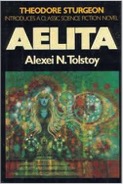Review
Aelita
1923
translated by Antonina W. Bouis
Foreign Languages Publishing House
Review by Peter Young on Live Journal (July 2010).
The enigmatic Tolstoy – distant relative of Leo – produced two enduring works of SF, this being one (the other being The Garin Death Ray which has been filmed twice in Russian). This edition comes with a lovely cover illustration from Richard Powers and a short but rather needless introduction from Theodore Sturgeon, and apart from its own impressive film treatment a year after first publication it also served as an uncredited template for the 1951 American SF movie Flight to Mars.
Tolstoy had complicated political views and some of them may have served to form the plot to Aelita, about a trip to Mars that discovers a race of humans, partially descended from the lost city of Atlantis on Earth, who are about to foment a revolution against their tyrannical leader and whose romantic, dreamy, blue-skinned daughter Aelita seems to be expecting a visit from some Earthmen. The two cosmonauts serve two separate functions to the story, one to kickstart the political uprising and the other to set off the interplanetary romance. There were moments early on when I thought Aelita could quite happily venture into being a rather confident comedy (such as dangling a mouse out of the spacecraft window to test the Martian atmosphere), although after getting his protagonists to Mars Tolstoy then gets strictly down to the business of getting the plot resolved, which I thought left many possible aspects of the story unexplored. I liked the sense of personal loss that seemed to envelope the spacecraft inventor M.S. Los from start to finish: he's a minor tragic figure in science fiction and could only be done properly as a mad Russian. I just wish Tolstoy – or at least his translator Antonina W. Bouis – had refrained from constantly referring to the spacecraft as 'the apparatus' although it does give the novel a rather welcome steampunk vibe. Not a great book, but as an example of early Russian science fiction it's an important one.
